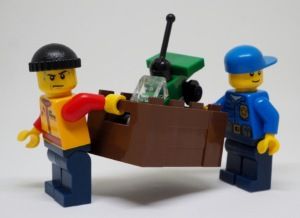News
Old Lego bricks potentially harmful to children, claims British study
This article is more than 7 years old.
Danish toy manufacturer’s own study suggests bricks in good condition are safe regardless of their age

Someone is destined for the scrapheap (photo: Pixabay)
Who doesn’t have at least a hundred pieces of old Lego labouring under or inside their furniture?
Well, according to a British study, we’re harbouring dangerous toys that could cause harm to children who play with them.
Malignant in the mouth
The University of Plymouth study conducted tests on 200 toys typically found in homes, second hand stores and daycare institutions, specifically testing for nine dangerous elements, including lead, barium, bromine, chromium and selenium.
Lego bricks were among 20 to contain all nine harmful substances, which if ingested in small amounts over a long time period could prove to be harmful.
The element levels do not comply with EU limit values, which only apply to new toys, not second hand ones. Red, yellow and black plastic items were the worst culprits.
Hazardous hand-me-downs
The results of the study have just been published in Environmental Science and Technology, and according to its author, Dr Andrew Turner, they make grim reading for the Danish toy manufacturer.
“Lego bricks from the 1970s and 80s are the big fail,” he told the BBC. “Toys in those days weren’t tested and now we’re using them and handing them down.”
However, Lego informs TV2 it has carried out its own tests and that old bricks from the 1970s aren’t harmful, providing they are neither damaged nor worn out.
Read the study here.










































